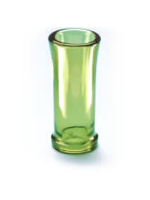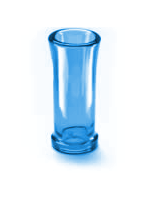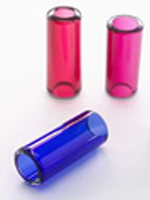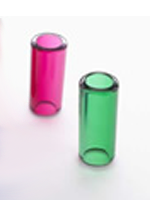
Bottles, Knives & Steel
Bottleneck / Slide guitar – probably the most ‘organic’ of any guitar effect…..all you need for this style of playing is a guitar, your fingers – and a slide!
Ahh, but which slide do you choose? Well for starters it’s probably the cheapest piece of kit you’ll ever have to find….but it’ll also be the most perplexing! Here for your interest is a resumé of all things 'slide' - both old, new, futuristic & fascinating!
From the origins of slide guitar in West Africa to the American connections of the late 1800’s – early 1900’s, when former slaves migrating to the Mississippi Delta at the end of the civil war were seen sliding penknives or pocket razors along the strings of ‘dollar 50’ Sears acoustic guitars and home-made one string ‘diddley bows’ – to today's high-tech slide guitar wizardry of Sonny Landreth and Derek Trucks; to the rural Delta Blues of Catfish Keith and the Hindustani Indian Raga's of Debashish Bhattacharya, every conceivable type of cylinder & bar imaginable that could coax a whine from guitar strings has been tried, discarded ~ or held in the highest esteem by it's faithful user.
And the list of materials offered to make that ‘perfect’ slide is huge - genuine re-cycled wine bottle necks; pocket razors & penknives as mentioned earlier; a vast choice of metals – bronze, brass, stainless steel, copper & aluminium tubes with mind-boggling variations of weights and lengths; porcelain & ceramic tubes; medicine bottles & test-tubes; spark-plug socket wrenches and even wood & polished bone have seen good use on the digits of many influential slide guitarists throughout the years.
But the general 'rule of thumb' here is – there really are NO rules regarding which is ‘the best’ slide – and as slide is such a non-orthodox form it’s purely a matter of personal choice using your own ears and hands to find ‘that’ slide tone which suits your own style of slide guitar playing.
So to assist you on your quest i’ve compiled this ‘tone chart’ below - with much appreciated help from dozens of slide afficionado’s over the past 30-plus years;
Glass Slides:


These give the guitarist a smooth, warm tone to slide playing. Firstly, the common ‘Pyrex’ commercial glass slides are inexpensive, available in a huge array of differing sizes and styles from most high street music shops – and they do the job quite well, especially when used on electric instruments.
The downside of this variation of the glass slide family is in the quality of the material used in their manufacture. ‘Pyrex’ is the recognised trade name for boro-silicate – the foundation sand of all glass production; this makes for an easily workable alternative to the more expensive, higher resonance leaded crystal glass slides available – ‘Pyrex’ is a lightweight, low-expansion, high-temperature melting glass, and can be prone to surface scratching after a short period of playing time.
Genuine wine-bottlenecks are slightly more expensive than ‘Pyrex’ and can usually only be obtained from specialist outlets – but the search is definitely worthwhile! Authentic bottleneck slides give a thicker, more 'top-end' tone with plenty of 'bite' - if you're searching for the traditional Delta / Country Blues tones of our pre-war blues heroes - especially on acoustic and resonator instruments - this is the glass slide for you!
The actual colour of the bottle glass can also affect your slide tone, with both light & dark green glass bottlenecks considered to have the best ‘glass quality’ for optimum warm tone & sustain – you can also find blue, brown or clear bottlenecks available. For an example here, blue glass gives a ‘harder’, less mellow tone than green glass – this is probably due to blue bottle glass not generally recognised as a re-cycled product….but they do look pretty cool!!
Hand-Blown Lead Crystal slides


Hand-Blown Lead Crystal slides are considered by many to offer the sweetest, most 'hi-fi' tonal response of any currently available glass guitar slide for all electric, acoustic & resonator instruments.
Although crystal is the softest glass produced in the glass industry, the pure resonance, weight & density of true lead crystal allows the player a quality & clarity of tone not found with soda-lime (commercial bottling glass) or 'Pyrex' (boro-silicate) slides.....if you tap boro-silicate or soda-lime glass tumblers with a nail, then do the same with a lead crystal glass tumbler of similar size - you'll find the 'ring' & smooth sustain of lead crystal will be sweeter & last far longer.
Durability is applied to lead crystal by 'annealing' the blown glass tube in the 'Lehr' and allowed to slowly cool over several days, providing the required necessary hardness against knocks & string wear.
‘Coricidin’ pill bottle slides certainly worked wonders for Duane Allman’s scorching electric slide work – and help Warren Haynes & Derek Trucks, the ‘dynamic duo’ of the current Allman Brothers Band, achieve their fluid electric slide tones to this day, but for mere mortals these type of slide lack the ‘density & mass’ formulation vital to get a smooth slide tone – certainly when applied to acoustic or resonator instruments.
Metal Slides
The plethora of commercially available metal slides can be positively mind-blowing! Again, all of these slides can be purchased at both high street and specialist outlets, but remember, the ‘density & mass’ formulation also applies when choosing a metal slide. From 1/2lb brass ‘behemoths’ to paper-thin steel tubing – all these can be easily sourced…the choice is yours.
Phosphor-bronze, plain bronze, brass and heavy stainless steel seem to be the favoured choice of ‘metal only’ slide players – with copper and aluminium all following close behind. Bronze type slides give a nice ‘bell-like’ tone (and being bronze – they certainly should!) with stainless steel providing a ‘harder’ edge to your tone. Metal slides will always sound less smooth and rounded tonally than glass slides ….it’s all about that ‘density & mass’ formulation again!
Two companies we highly recommend for metal slides are 'DaddySlide' based in Germany for custom-order brass, bronze, steel & German Silver slides (www.daddyslide.de); and here in the U.K. Wolfram Slides (www.wolframslides.com) offer their incredible tungsten-carbide slides.
Porcelain / Ceramic / Stoneware Slides
Porcelain / Ceramic / Stoneware slides offer the player a sweet, smooth tone & sustain, albeit noticeably quieter than glass or metal on acoustic & resonator instruments ~ but, in similar fashion to ‘Pyrex’ slides tend to wear out quicker than the aforementioned metal & glass derivatives, with Stoneware being the most durable of the trio. These slides are created from 'fired ' clay, which offers a glazed outer slide wall with a matt-finished, unglazed inner slide wall that soaks up unwanted perspiration – they are quite inexpensive and easily available for experimentation.
Two highly-rated makers of ceramic / stoneware slides we thoroughly recommend are Todd 'Doc' Sigmier's 'Rocky Mountain Slides' range created from black Colorado clay; www.rockymountainslides.com, and Jay Seibert's 'Paloma Stone Slides' made in Washington State; www.stoneslides.com
The subject of ‘which slide’ can be discussed at length for hours, with the pro’s & con’s of weights, lengths, internal/external diameters and materials bringing in as many differing opinions as there are slides! As i stated at the beginning of this article, there are no etched in stone rules as to which can be considered 'the best' slide….but in my own, purely personal opinion – and armed with many years of slide research - if you find a good quality, authentic green glass wine bottleneck & a nice, heavy bronze, brass or stainless steel metal slide….you’ll find yourself pretty close to slide ‘nirvana’!
Good luck with your search – and ‘Happy Slidin’!
Ian McWee; Guitar Slide Consultant.





